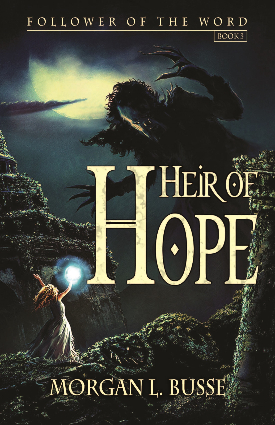‘Heir Of Hope’ Is A Terrific Ending To The Follower Of The Word Trilogy
The brilliant Follower of the Word trilogy by Morgan Busse concludes with Heir of Hope.1
The story starts slightly before the end of the previous book, with the meeting of Lore with Nierne and Caleb, and then follows three separate lines. These include the points of view of the villainous Shadonae, Valin and Malchus; the hardships of Rowen; and the journeys of Lore, Caleb, and Nierne. The last three heroes are making their way to the ruined city of Thyra to save Rowen and fight the Shadonae.
Busse set a hard task for herself in showing and developing three different narratives, having them intersect when necessary, and giving them all proper focus.
I admit the story became a bit too pat in some areas, and I would have liked more emphasis given to other areas. For instance, more time could have been devoted to Caleb and Lore’s developing friendship and Caleb receiving Lore’s forgiveness. Nevertheless, what was shown, on top of the plot device of the passing time in between our snippets of their interactions, did make a satisfying explanation for their character development.
Rowen was the hardest character for me to like reading about. I mean, her moral steadfastness and resoluteness was really impressive and great to see. But one trial of suffering after another made her narrative too hard and depressing. I mean, I actually would find myself decidedly not looking forward to the parts of the story having to do with her. Also, where were her impressive skills in martial training? I can’t believe that the guards are all incapable of fighting with no sword. Then again, Lore was kinda useless without his blade, so it was consistent.
I had some dislike for the literal deus ex machina that so many books in Christian fantasy have, and found it a little annoying here too. What made it better was that a) the characters struggled, and b) because of that their task wasn’t easy. Yes, the Word intervened, but it was hard for the character it happened through, and if it weren’t for the Word being God and all, it would have been a tragic ending. On one hand the story was much more compelling and had almost a pretty good balance between God doing everything and no strain for the characters. On the other hand the characters did much on their own without intervention from a Deity.
Despite the above, and some dissatisfaction with the small scope of the story (I would have liked a wider war, not just a one-city battle), I did greatly enjoy this story. The resolutions at the end are both nice, with avoiding both pitfalls authors can fall into. Either the more common one of giving too little of a payoff of happy characters in the end, or spending too much time on them. Busse hit the perfect balance here.
As for the characterizations of the other principals, they were great. I loved Caleb and Nierne. Caleb is a dangerous and methodical, yet now a good, man who serves the Word, the Creator of this fictional world. Nierne is naive and not seemingly good for fighting as Rowen might have been in other circumstances and has no powers. She makes up for it with the personal courage to risk all to help others.
In fact, her willingness to suffer at the end for many is a great lesson to readers. We have all had those moments when something hard comes up, some choice to make. We hem and haw and debate it. We pray–which is good, as is, to be fair, thinking it through. But to go beyond that to avoiding doing the right thing, is not good. It is a sin. We need not just obedience to God at such times, but courage. That courage is shown by Nierne in this story.
Lore? Well, Lore is the senior member. The tactician. The big brother character. The rock on which others can rely. He didn’t have as many badass moments as Caleb did, but his presence was critical. He was the wise leader and fighter to Caleb’s more outright loner fighter persona.
What I took as the theme of this book was Providence and its interplay with free will. Why did the horrible things happen? Why did our characters struggle so? Well, for the same reason they ultimately triumphed. Because the Word allowed it. If you look at the end of the story, every character was where they needed to be for the victory to occur. Both major players and even minor characters who had a bigger impact than you might believe. They all were there. And before that, even the suffering we hear about is Word not being callous but allowing free will to happen, to give time for repentance, so on.
As for the villains, well, while I pitied them a little bit, I didn’t feel empathy for them. If Busse wanted me to do so, that was the only area of characterization wherein she fell short. I did understand them though, which was good.
I feel both joyful and disappointed–joyful because I finished a great series and disappointed because now I am leaving these characters behind. I hope maybe someday Morgan Busse goes back and revisits Rowen, Lore, Caleb and Nierne. I would love to see more adventures from these folks.
One final note: Knowing that Busse likes Terry Brooks was something I reflected on as I read this. This book, more than the other two, was very much a “quest” book. Very reminiscent of Brooks’ works that I’ve read.
Rating of 4 stars, and highly recommended.
- A previous version of this review was published elsewhere. It has been reprinted at SpecFaith at the author’s request. ↩






































